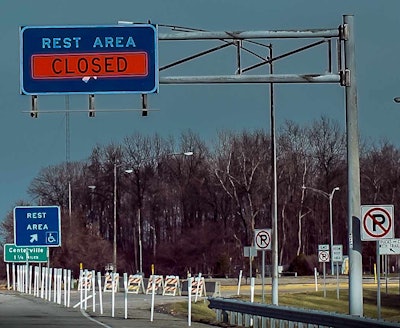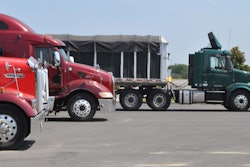 The FHWA is beginning to look at ways to possibly expand commercial activities at rest areas to help states keep them open. (Photo by 365 Trucking)
The FHWA is beginning to look at ways to possibly expand commercial activities at rest areas to help states keep them open. (Photo by 365 Trucking)A notice published in September in the Federal Register by the Federal Highway Administration seeking public input on whether states should be allowed to expand commercial activities — such as adding more vending machines or selling produce — at rest areas has sparked contention between driver advocacy groups and an association representing truck stops.
The expansion of these services would allow states to bring in more money and possibly help keep rest areas open as parking options for truckers, FHWA says.
The National Association of Truck Stop Operators (NATSO), however, says expanding commercial services at rest areas, including even vending machine services, threatens to undercut truck stops and other off-highway businesses. The group wants FHWA to keep the existing rules in place that limit the services states are allowed to provide at rest areas.
“FHWA should not permit any food sales at interstate rest areas that undercut highway-based businesses and localities,” said NATSO President and CEO Lisa Mullings. “Congress enacted the ban on rest area commercialization to avoid state-approved monopolies on the Interstate System as well as to protect off-highway businesses and localities. The underlying purpose behind the general ban on offering automotive and other commercial services on the interstate right-of-way remains as strong today as it was when the legislation was first enacted.”

Others said that given the country’s truck parking crisis, allowing more services at rest stops should be permitted if it means keeping rest areas and their truck parking spaces open.
The Owner-Operator Independent Drivers Association says FHWA should consider options that would make rest areas “as financially viable and self-sufficient as possible.” OOIDA says it realizes expanding these services could impact truck stops, but it says FHWA should prioritize both private and public options that increase parking capacity along interstates.
 What’s your view — should more services be allowed at rest areas? If you’re reading on a smartphone, tap the image to call and leave us a message to weigh in with your story. We’ll round up responses in a special mailbag podcast. Alternately, drop a comment below. If you’re on a desktop, call 530-408-6423. Make sure to tell us your name and state of residence.
What’s your view — should more services be allowed at rest areas? If you’re reading on a smartphone, tap the image to call and leave us a message to weigh in with your story. We’ll round up responses in a special mailbag podcast. Alternately, drop a comment below. If you’re on a desktop, call 530-408-6423. Make sure to tell us your name and state of residence.In addition to OOIDA, trucker advocate group Truth About Trucking also voiced its support for expanding commercial activity at rest areas. The group says that if allowing more of these services at rest areas will help states maintain current facilities and possibly create more, it’s in favor of altering the current rules.
Truth About Trucking adds that allowing states to promote and sell their agricultural products at rest areas, which was one of FHWA’s possible solutions in its notice, would not only bring more revenue to the states, but it would also give truckers healthier options when stopping at one of these locations.










